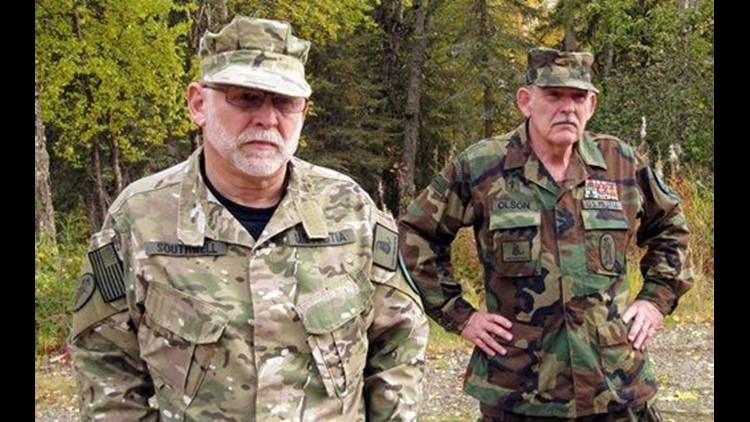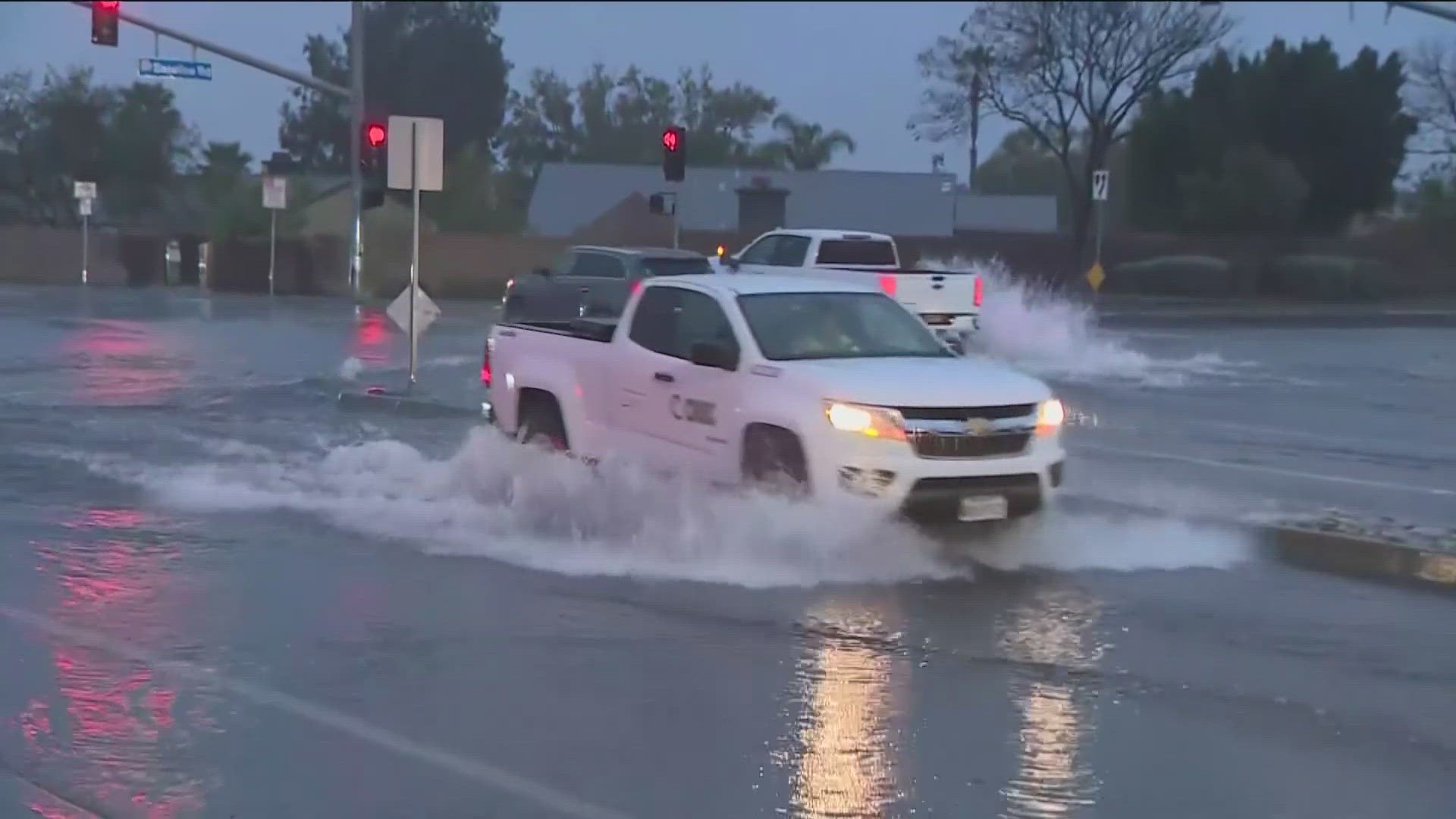NIKISKI, Alaska (AP) — Norm Olson's genial tone belies his reputation as a radical militiaman, yet here he is, at 63, an affable grandfather explaining why Americans should arm themselves against their government.
Walking stick in hand, clad in military fatigues, he strolls a trail in the woods near his home, located on 22 acres near Nikiski, a small, unincorporated community with isolated roads and no local government. The nearest state trooper post is two towns away.
A fellow militiaman, armed with an assault rifle, walks along as Olson — a man whose conspiracy theories were so extreme that he was kicked out of the group he founded, the Michigan Militia, 15 years ago — discourses on the need for a paramilitary Alaska Citizens Militia.
He lays out his ideas about imminent economic collapse and social chaos incited by federal bailouts and other forms of intrusion by a tyrannical government.
Olson's militia is minuscule at the moment, but there has been a resurgence of the militia movement nationwide, in part coinciding with the advent of the Obama administration. At least 50 new right-wing militia groups have been identified by the Montgomery, Ala.-based Southern Poverty Law Center, a nonprofit civil rights organization. All have formed within the last two years, many spreading their speeches and combat exercises on YouTube.
"It's the response to fear," Olson says.
Olson lets that sink in. Then he adds: "The federal government can roll into your driveway in the middle of the night and snatch you up and take you away and you'll never be seen again."
___
If the words sound familiar, there is good reason. It is rhetoric that was typical of the so-called patriot movement of the 1990s, amid similar circumstances: A Democrat, Bill Clinton, was in office. There was heightened interest in gun control legislation. Veterans were returning from the first Gulf War. Elaborate conspiracy theories were spreading.
Today's troubled economy and the perception that other countries are rising in influence might also be fueling activity among white supremacist and militia groups, according to an intelligence assessment by the federal Department of Homeland Security.
A significant difference this time, according to the April analysis, is that the nation has its first black president. "Right-wing extremists," the report says, "are harnessing this historical election as a recruitment tool."
There is a violent edge to this movement. Lone wolves and small groups who are "embracing violent right-wing extremist ideology are the most dangerous domestic terrorism threat," according to the report. It cited an April shooting in Pittsburgh that left three police officers dead at the hands of a gunman reportedly influenced by racist ideology and fears that a gun ban was imminent with Barack Obama in charge.
In the first five months of Obama's presidency, racist, right-wing extremists killed at least nine people, according to Chip Berlet, senior analyst with Political Research Associates, a Somerville, Mass., think tank.
Such attacks are a vent for racial anxiety and outrage at the perceived liberal government by people who feel powerless to reach the political elites, according to Berlet. Instead, they target those within reach.
"It's a perfect storm for violence," Berlet said. "You ignore it at our peril."
But Jonathan White, a professor at Allendale, Mich.-based Grand Valley State University who has done extensive research on violent extremism and terrorism, says most militia members are "rhetoric only" — and that's where he puts Olson. The danger comes, he said, when these ideologies prompt paranoid "Alamo" groups to gear up for a standoff with the perceived enemy.
___
The lake behind Olson's house gleams like pewter under the overcast sky as he stands before a backdrop of trees that are turning autumn gold.
He's a long way from Michigan, where he was booted from his own militia after charging that the 1995 bombing of the Oklahoma City federal building, which killed 168 and injured more than 680, was a conspiracy between the United States and Japan.
Ultra-extremist Timothy McVeigh and his co-conspirator Terry Nichols were convicted in the devastating attack; both McVeigh and Nichols had attended Michigan Militia meetings.
Olson, a retired Air Force master sergeant, started another militia before fading from public view. Then several years ago, he and four other militia peers — including Ray Southwell, co-founder of the Michigan Militia — moved to Alaska, settling in Nikiski, a four-hour drive from Anchorage.
All brought their families, including Olson's wife Mary and their daughter, son-in-law and grandchildren. Olson, also a former Baptist minister, holds non-denominational services at his home on Sundays.
For years, Olson and the rest lived quietly in Alaska. Olson was appointed to the service area board of the nearest hospital, where Southwell works as an emergency room nurse.
Olson says the newcomers were attracted to Nikiski, a community of about 4,400, after researching it's reputation for being rough around the edges, stubbornly independent and suspicious of government.
"I knew that we wouldn't be rejected," he says. "People have left us alone and we've gotten along well with our neighbors."
But his presence did not go unnoticed. It was mentioned in a July 2005 situation report by the state's Division of Homeland Security. Olson said he has also met with representatives of the FBI and Alaska State troopers. The agencies won't discuss specifics; Olson says they talked about the reemergence of the militia and past mistakes by federal agents, citing Ruby Ridge, Idaho, where an FBI standoff with white separatist Randy Weaver left three dead in 1992, sparking the movement.
Olson says other groups already represent the militia philosophy in Alaska, pointing to outfits such as the 7,000-strong Second Amendment Task Force out of Fairbanks, whose members meet to study constitutional law and openly carry guns and rifles on weekends.
So far, the Alaska Citizens Militia has been slow in building its ranks. Only 20 people attended an introductory meeting in September, and no one signed on.
Obama's race, Olson insists, is not an issue. The militiaman carrying the assault rifle and accompanying him on this walk is, in fact, black. The ex-Marine does not want to be identified, saying it would undermine his role as a combat weapons trainer for any patriot who asks. He says his big gun guards against bears.
Olson wants it known that violent individuals aren't welcome to join. Anyone who wants to blow up a bridge or kill a judge need not apply, he says. And he says there is no reason for anyone to be frightened by his rhetoric.
"When I say we need to stand up and shake the gun in the face of the tyrants, we're not against the American people," he says. "We're not even against the United States government. We're against the tyrants inside the government."
This time around, he doesn't envision taking a training role as he did with the Michigan Militia, 15,000-strong at its height. And please, he says, don't call his property a compound.
"I'm 63 years old. I don't have the energy to be, you know, grunting back through the woods," he says. "I'm a flag waver. That's really all I am today."
Copyright 2009 The Associated Press.
Militia movement resurfaces across nation



